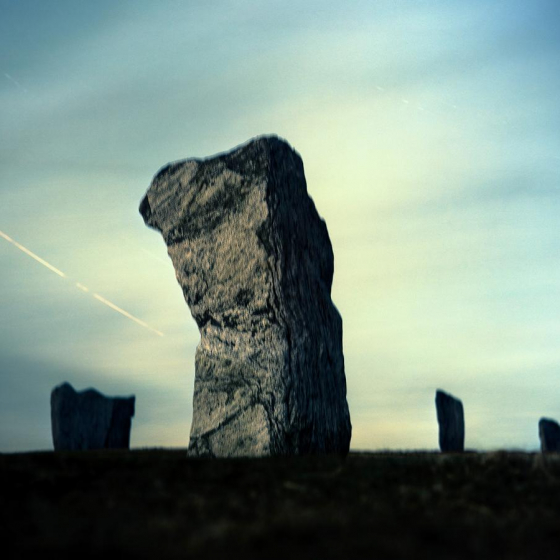CDS Photo Instructor MJ Sharp Receives 2021–22 Fulbright for Project in the UK
Callanish I, Isle of Lewis, Scotland, 2010 | Private Collections
MJ Sharp, a Lecturing Fellow of Documentary Studies at Duke University and a longtime photography instructor at the school’s Center for Documentary Studies (CDS), has been named a Fulbright Scholar for the 2021–22 academic year. The documentary and fine arts photographer will pursue an arts/science project, “Our Disappearing Darkness and Recreating True Night,” at the University of Exeter, UK, building on more than a decade of work making large-format, long-exposure photographs. Sharp will collaborate with Dr. Kevin Gaston, an Exeter professor of biodiversity and conservation who is developing “nighttime ecology” as its own scientific discipline. “Ninety-nine percent of the population of the United States and Europe experience light-polluted skies to the point that well over half of them can no longer see the Milky Way. Modern ‘darkness’ is actually only dim,” writes Sharp. She and Gaston will work on “immersive art installations that are scientifically rigorous simulations of night—from the ancient sites of Cornwall that are moon and star related to the uncanny experience of pure darkness that heightens all other senses.”
Sharp has been an undergraduate photography instructor at CDS since 2012. Says CDS undergraduate education director Chris Sims, “MJ is a beloved and inspiring teacher to students who flock to her black-and-white darkroom and experimental documentary photography courses. In her own work, MJ has been engaging with nature and the environment in ways most of us don’t see—long exposures of gardens overnight, the extended decay of fruits and insects—and draws us in as viewers with a unique color palette and a sense of foreboding mystery. I’m intrigued and excited to see where her Fulbright project in the UK will take us as viewers, and am delighted she’ll be able to bring those experiences back to our students at CDS.”
Writes Sharp, "I am thrilled and honored that the US-UK Fulbright Commission is entrusting me to carry out this wide-ranging and ambitious proposal. After decades of experience in low-light photography, including stories about endangered nocturnal species, this turn to installation/experiential art is new. There are so many artists whose installations I have long admired—James Turrell, Ann Hamilton, Bruce Nauman, Olafur Eliasson, Marina Abramović, and Bill Viola—and whose work provides inspiration for this attempt at helping people experience their prehistoric nocturnal creaturely selves.
Light pollution proliferates unchecked in our populated areas, spills over into our rural areas, and all the while robs us of any memory of the grandeur of the night sky and our spooky-magical somatic response to darkness. It is my hope that people who experience these exacting simulations of a very specific prehistoric night—bronze age Cornwall with its night-sky-related ruins—will bring back from that experience a new appreciation for night and an interest in preserving it in modern times.
An excellent resource on light pollution and preserving the night sky is the International Dark-Sky Association. A favorite deep dive into pre-modern night is Roger Ekirch’s groundbreaking book, At Day’s Close: Night in Times Past. Jeanette Stokes, founder of the Resource Center for Women in Ministry in the South, emboldened me to stay with the notion of darkness long before it was clear I would find anything there. The UK Fulbright Commission and The Josiah Charles Trent Memorial Foundation Endowment Fund are helping fund this project. The stability of our multi-year Duke Faculty Union contract freed up the psychological space to conceive of this project."
MJ Sharp bio; samples of her work at mjsharp.com.

